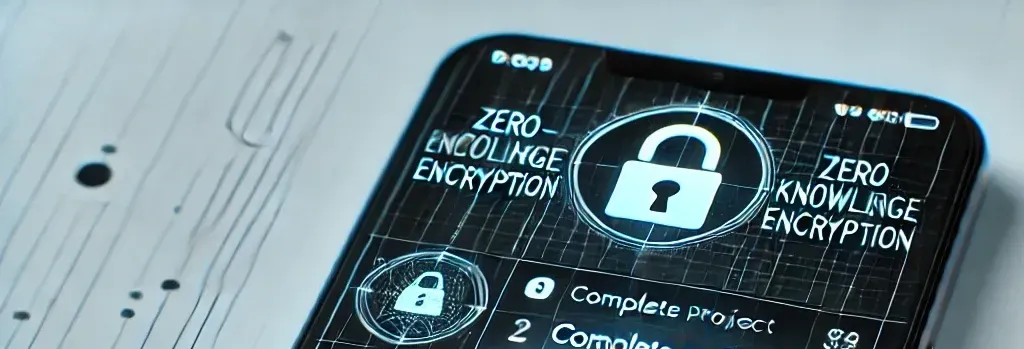Understanding Zero-Knowledge Encryption

In a world where data breaches, hacks, and privacy concerns have become everyday news, ensuring the security of personal information is more critical than ever. For businesses and individuals alike, protecting sensitive data is no longer just a matter of good practice—it’s a necessity. One of the most advanced and reliable methods to safeguard information is through zero-knowledge encryption (ZKE), an encryption model that provides robust data privacy. But what exactly is zero-knowledge encryption, and why is it becoming essential for productivity and task management apps?
What is Zero-Knowledge Encryption?
At its core, zero-knowledge encryption is a security method where the service provider does not have access to the keys required to decrypt your data. In other words, the company offering the service literally has “zero knowledge” of your encrypted information. This is in stark contrast to other encryption models, where service providers may still be able to access your data under certain conditions, such as for maintenance, security checks, or under legal requirements.
With zero-knowledge encryption, the data is encrypted on your device before it's sent to the server. Only the person or entity with the proper decryption key—usually you—can decrypt and access the data. Even the service provider cannot see the contents of what you’re storing or sharing.
How Zero-Knowledge Encryption Works
Zero-knowledge encryption is based on several cryptographic techniques, including public-key infrastructure (PKI) and advanced encryption standards (AES). The basic process goes something like this:
- Data encryption at the user’s end: Before any information leaves your device, it is encrypted using your unique key. This ensures that no readable data is sent over the internet.
- Transmission and storage in encrypted form: Once encrypted, the data is transmitted and stored on the service provider’s servers in this scrambled, unreadable form. Even if a malicious actor were to intercept the transmission or access the servers, they would only encounter gibberish without the decryption key.
- Decryption by the end user: Only when the correct decryption key is provided (by you) can the data be transformed back into its readable form.
This design provides unparalleled security because it reduces the attack surface—hackers or even the service providers themselves cannot access your private data.
Why is Zero-Knowledge Encryption Important?
1. Enhanced Privacy
One of the most important benefits of zero-knowledge encryption is the level of privacy it provides. With ZKE, you maintain full control over your data. You are the only one who can access the contents, which is essential for safeguarding personal or business information from prying eyes, data mining, or other forms of surveillance.
2. Reduced Risk of Data Breaches
Even companies with the best security protocols can fall victim to cyberattacks. However, with zero-knowledge encryption, even in the event of a breach, hackers would be unable to access any meaningful data. Since the encryption keys remain solely with the user, unauthorized access becomes almost impossible.
3. Trust Without Compromise
Many services, especially cloud-based platforms, claim to have high security standards, but often still retain some access to user data. Zero-knowledge encryption eliminates the need for this trust compromise. By ensuring that the provider never has access to your unencrypted data, users can fully trust the service while maintaining complete control over their information.
4. Compliance with Privacy Regulations
With the growing number of privacy regulations like the General Data Protection Regulation (GDPR) and the California Consumer Privacy Act (CCPA), companies are required to handle user data with extreme care. Zero-knowledge encryption can help businesses remain compliant by minimizing the amount of personally identifiable information (PII) that they can access, reducing the likelihood of data breaches that could result in non-compliance.
Why Zero-Knowledge Encryption is Crucial for Productivity and To-Do Apps
Now, you might be wondering—how does this all relate to something as seemingly simple as productivity and to-do apps?
Apps used for managing tasks, goals, and projects may not seem like obvious candidates for advanced encryption. However, these apps often contain a wealth of sensitive information. From personal notes and meeting details to work deadlines and even financial reminders, a to-do list app can house important data about your life or business operations. The implications of that data falling into the wrong hands can be serious, whether it’s a competitor gaining insight into your project timelines or a malicious actor exploiting personal details.
Here’s how zero-knowledge encryption can elevate productivity apps:
1. Confidential Work Projects
Professionals using to-do apps often manage their entire workflow within these platforms, storing everything from strategy outlines to sensitive client data. Zero-knowledge encryption ensures that all this critical information remains secure, even from the service provider itself, fostering confidence and peace of mind in the tool’s reliability.
2. Secure Collaboration
Modern productivity apps often come with collaborative features where multiple users share and update tasks in real-time. With zero-knowledge encryption, each participant can be assured that no third party—including the app provider—has access to the collaboration details. This is especially important for teams handling confidential projects.
3. Personal Privacy
Even on a personal level, to-do apps store an immense amount of private information. These could be anything from medical appointments and family events to financial planning and passwords. With zero-knowledge encryption, users can feel secure knowing that their data is protected, even from accidental leaks or unauthorized access.
Conclusion
Zero-knowledge encryption is rapidly emerging as a gold standard for privacy and data security. Its ability to safeguard sensitive information without granting access to service providers sets it apart from other encryption models. For productivity and to-do apps, where users often store vital personal and professional information, ZKE can be the key to ensuring that this data remains truly private and secure. As privacy concerns continue to grow in the digital age, the adoption of zero-knowledge encryption is likely to expand, setting new expectations for security in everyday digital tools.





